Leader Corporate Services Limited is a leading Hong Kong based provider of company setup and Company Secretary services for companies of all sizes that are looking to locate in Hong Kong. This is an interview with its Founder & Director, Ms. Belinda Wong.
Script of Interview
Interviewee Ms. Belinda Wong (BW)
Position Founder & Director
Company name Leader Corporate Services Limited (LCS)
Company website URL https://lecorp.hk/new/
Interviewer John D. Evans, CFA (JE)
Date of Interview: 22 September 2021
About Belinda Wong
JE Okay, good afternoon to the viewers of SEIML Ventures. This week in our interview series, we’re speaking with Ms. Belinda Wong, who is the Founder and Director of Leader Corporate Services Limited in Hong Kong. Brief Introduction of leader Corporate Services Limited, it’s a leading Hong Kong based provider of company setup and company Secretary services for companies of all size that are looking to locate in Hong Kong. So, I’m very interested to learn about the different aspects of the administrative side, related to businesses that every company must pay attention to. So well, it’s an interesting and a different team talk today. So good afternoon, Belinda. Welcome to SEIML Ventures.
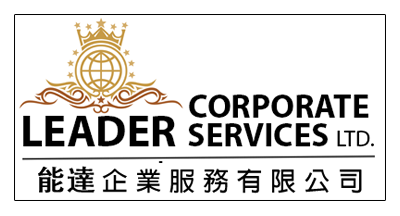
BW Hi, John. Nice talking to you.
JE Okay, so, as always, for the viewers, as a first interview will go through this in four parts, we’ll have a brief introduction, where Belinda will talk about herself and her background, then we’ll focus on the company discussion, Leader Corporate Services, learn a bit about its history, exactly what it does, its target market. Then we’ll talk about the whole area of the industry in Business Administration, company registration and related areas. And then we’ll close off where Belinda will give us a case study of a company she worked with just so everyone can see a practical example of how things work and progress. So, on that note, let’s start off learn a bit about Belinda’s background. So, Belinda, why don’t you give us a brief overview of yourself where you grew up, lived, etc. and a little bit of a background as to sort of the training and background you needed to start a company of this nature.
BW Okay. Well, I was born and spent all my life in Hong Kong when I graduated from the Chinese University of Hong Kong, my major subject was in sociology, which was a very theoretical subject, so there’s no specific industry I could join. So, I took up the examination of the Institute of Chartered secretaries and administrators in UK and then I got some vacancies in the companies that service in a local service provider. Then this is how I started my career. And then I changed jobs from time to time, also within the same industry. And after a while, I took up the MBA course of the University of Strathclyde and also took up some other examinations, like the Hong Kong Institute of Investments and Securities and Investments in Hong Kong security and investment institutes. And then I became a Fellow this year. This is how I started and continue my career in the company’s field.
JE Okay, so mostly all your life you’ve been living in Hong Kong, but did you go to study in Strathclyde to take your MBA? Were you living in the UK or doing that remotely?
BW That was a remote distance-learning course organized with a local university back then.
JE Okay, very interesting. So now is this Leader Corporate Services, your only or prime business or do you get involved maybe with other companies and other matters?
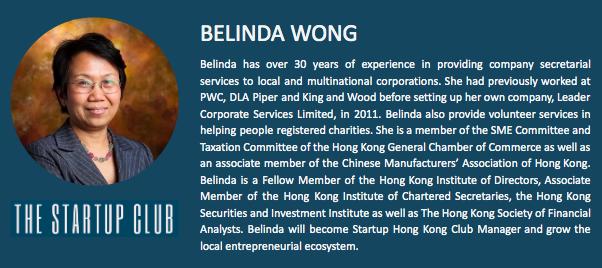
BW In early 2020 ,after I saw the spread of the virus in China and Hong Kong, I decided to pick up the offer from a German guy who has started the startup club in Europe to form the startup China platform is in Hong Kong. The reason is, I had gone through the SARS in 2003 which affected the economy very badly here in Hong Kong. So, I thought, why don’t I try something new to try to connect China, Hong Kong, with Europe and US. Hopefully there could be some business opportunities related after the pandemic gone away. But unfortunately, the pandemic has lasted almost two years now, but one, after I setup the South China club in Hong Kong, a Malaysian Professor approached me to join his training team of the Asia Independent Academy in Malaysia. He has other contacts in other countries. Last month we have done a joint webinar, which was co organized with Wolters Kluwer, the publisher of my practice manual. The title was ‘regulatory framework for doing business in Malaysia with Hong Kong. So, a bit of a promotion for Hong Kong, and also some linkage with Malaysia.
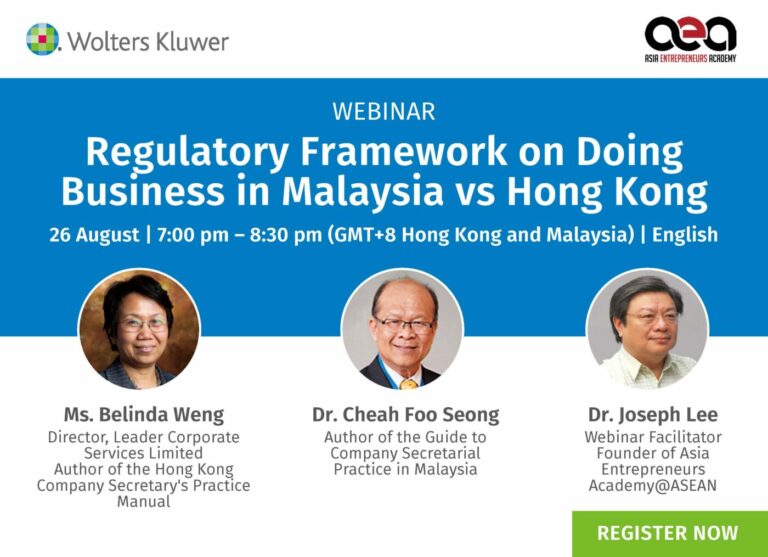
About Leader Corporate Services Ltd.
JE Okay, very, very interesting. So, I guess it’s only normal, since you’re involved in helping a lot of companies get set up. Then you know, getting more broadly in companies’ set up and business cross border, I guess makes sense and Hong Kong is a very international city. So that all makes sense. So, let’s, let’s turn now to the second section and focus on Leader Corporate Services. So firstly, tell us about how it came to be when exactly and how you came to found it and to find it, or started by yourself?
BW Well, I started Leader Corporate Services Limited in 2010. After spending some decades in the company’s secretarial industry, for so many years working as employees, for big firms and international law firms. It’s time to start on my own two tests. First, first, my professional knowledge whether this could attract clients. So, engage my service, and also I could decide on who I can serve and how I can serve my clients. So, my objective is to provide reasonable quality service for the clients I serve, and also those I could provide some better service.
JE Okay, so you’ve been in business 11 years now. So obviously, the company has been successful. Has there been one or two critical events along the way that have helped your company progress or develop in those 11 years?
BW Well, when I first started my company, I didn’t have lots of contacts. As a professional, though, I don’t think I should poach my former clients. So, my decision was to build up my network from scratch. So, I started I started using LinkedIn to expand my network. So, first of all, I decided whom I should contact. So, the people I decide to network with are those finance guys, legal and accounting guys, who may have a preference to setup business in Hong Kong. Once I started getting those contacts in my network, a Dutch guy engaged my services and setup several companies. And later on, he will refer his friends to set up companies with me. This is the first achievement. And then the second significant progress in 2015. In 2014, Hong Kong has a new company’s ordinance. And at that time, it was Walters Kluwer I’ve already written two editions of the Hong Kong company secretaries practice manual for his publisher. They engage me to write a third edition and as the new company ordinance is so new to everyone in Hong Kong, so my book was quite popular, very popular. And then Walters Kluwer called me to write another title in Hong Kong Company Secretary’s , in 2016. So, my, my brand name has been fully established. And then in 2015, when the 3rd edition of the Hong Kong company, secretaries practice manual was published. Then some training companies started engaging me to speak at seminars, which got CPD hours from professional firms of Hong Kong law society, and then later on some other accountancy, professional bodies in Hong Kong.

JE Okay, now, that’s interesting, because I’m just going to comment on those two points. The first one, when you were talking about LinkedIn, and building the network, one of the things I’ve come to appreciate even more over the point of the pandemic, how important digital marketing is for all companies, small companies, and SMEs. I don’t think a lot of small companies either have the resources or have focused on those enough, but digital marketing and a digital business development, it’s really essential to help a business grow. Your second point about the manual touched me because I, when I was teaching at the university in the UK, I also ran their professional education program, which had qualifying certificates for CPD from some banking institutes. And so, as you are the author of the manual, of the book that you’d refer to, it creates you, it puts you forward as a subject matter expert, which then gets involved into the training. And that’s also a great way to build up the network. So, I, I see some similarities there that’s very interesting. So, I know the position ‘company secretary’, I’ve been involved with certain companies and I sort of know what that person does. But what are all the aspects of company secretary services? What are all the things a company secretary has to do? And what are all the things that you help them with?
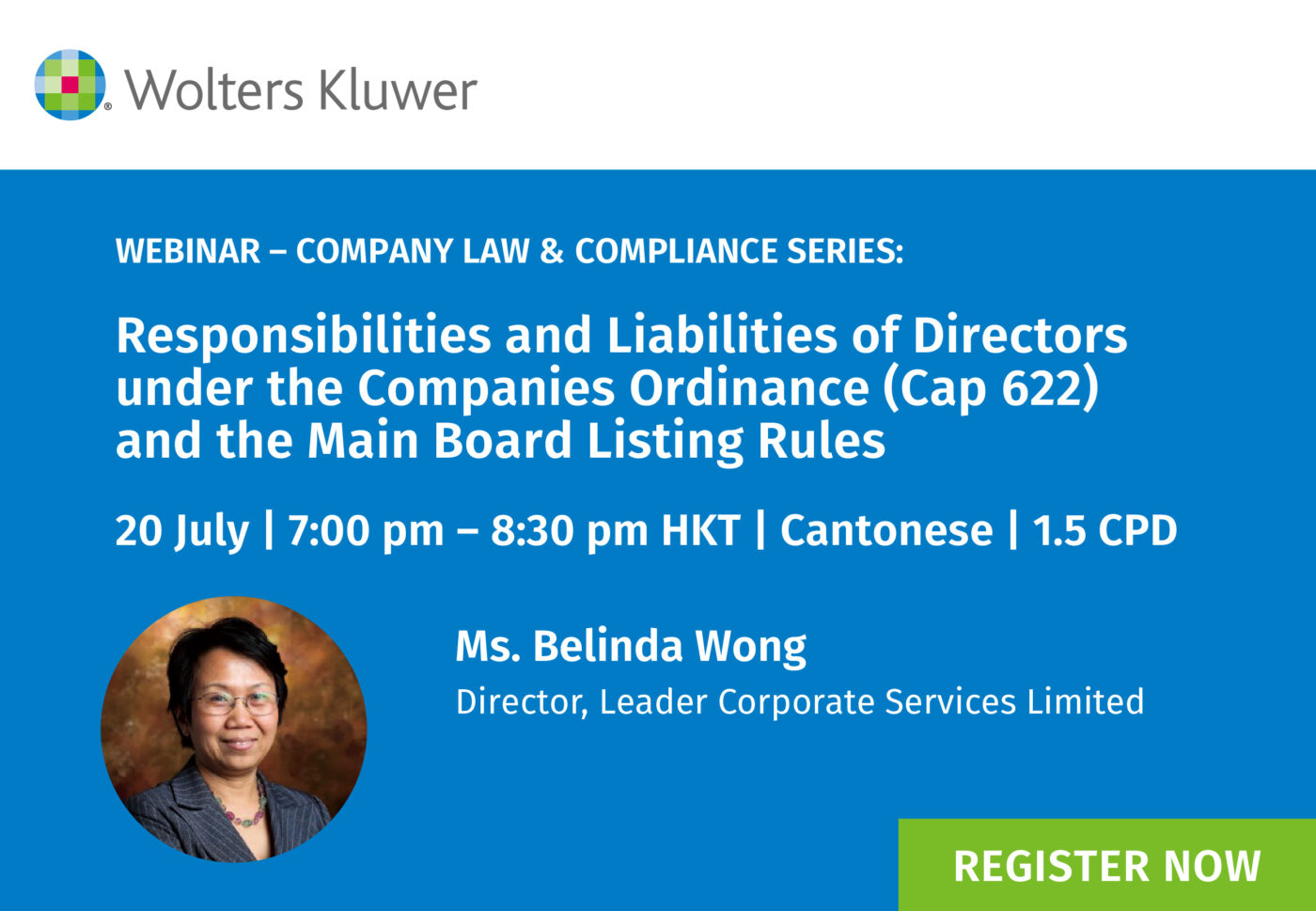
BW Well, in a nutshell company formation, but on top of all the regulatory requirements in Hong Kong ordinance, like annual filing with the company’s registry, which oversees the administration of the Hong Kong companies’ ordinance. If there are requirements for the company to spend its capital, then we will attend to the increase of the share capital, the change of officers, directors, secretaries and special matters, which require shareholders, or members meetings, then we will arrange meetings with directors, and also shareholders. I also comment on draft shareholders agreement, which govern the rights and obligations of the various parties, involving shareholders, even directors in the administration of the company. On top of this, a Hong Kong company has to have audited financial statements, I don’t do this. But I will arrange introductions or to appropriate tax and audit professionals to provide service. As most of my clients are from overseas, if they come to operate in Hong Kong, they may need office so I will line them up with real estate agents or co working space companies so that they can have some appropriate offers to work with, etc. So wherever, whatever they need, I’ll try to get them aligned with those profession, those professional services. I can do this because I’m a member of the Chamber of Commerce and also The Chinese Manufacturers Association, so I had lots of contacts in very different industries. So again, do the introductions.
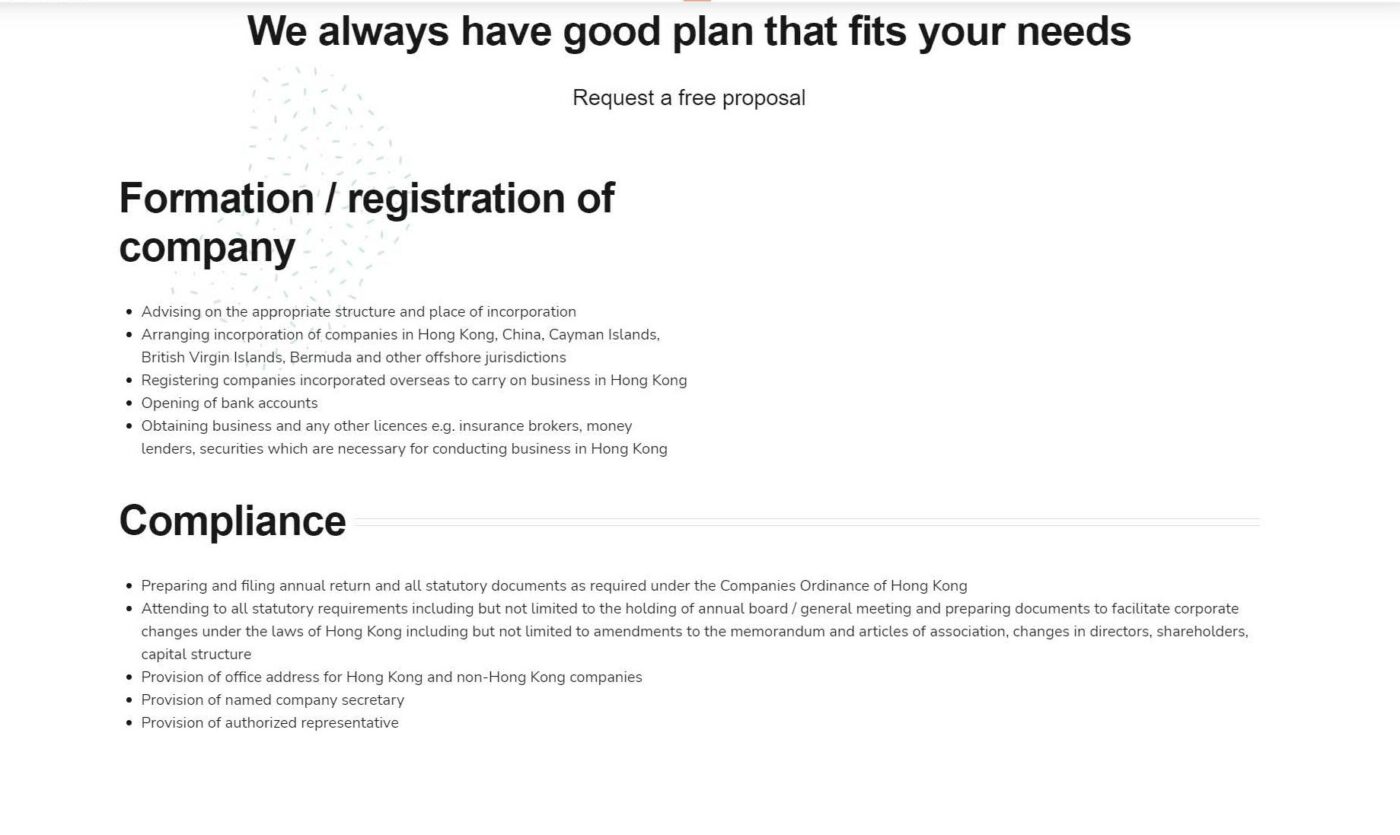
JE Okay. So, it’s not just about when a company is starting up and registering, there’s ongoing regulatory reporting requirements. And there may be what we call corporate actions, where there is an increase in share capital or things. So, does that mean that your business relationships or contracts are not necessarily short term but maybe sort of continuous? And helping companies on an ongoing basis with regulatory reporting? Are client relationships or contracts short term, or are they more longer term in nature?
BW Well, is very long terms. Most times, stick with service provider from birth to death. So, in Hong Kong,
JE Hopefully you’re not at too many funerals.
BW Well, actually clients have different projects, they use different companies to handle different projects. Once a project has been completed they may decide, you know, it’s better to put a company to rest or even to death. So, I’ll arrange the death. The registrations and if the company needs liquidation then I’ll arrange and accountant to handle the liquidation. In Hong Kong, some clients may require notarization of documents or even some legal advice. I can also line them up all those legal professions.
JE Okay. So, you mentioned that in addition to the Chamber of Commerce, you belong to a manufacturing association. So are your main customers from one or two industries like manufacturing or are they from a lot of different industries,
BW From different industries. Initially, the clients are from finance. As I said before, in LinkedIn, I had those, those contacts from finance, legal and also accounting. But later on, the clients’ portfolio expanded. I even have multinationals with headquarters in US, UK, and some of them are in manufacturing, some of them in insurance, so financial focus.
JE Which I guess is probably the biggest industry in Hong Kong. So where is your office located in Hong Kong? Are you in in Central, Kowloon and do you have more than one office?
BW Well, I just have one office. Central.
JE Okay. Okay. Tell us a little bit about the Hong Kong Secretary practice manual, I think you corrected me and saying it’s the fifth edition. And is that sort of like a CA handbook, that, you know, a company Secretary always has by as a reference resource, or is it more a training manual? What is the key purpose of the Hong Kong Secretary practice manual?
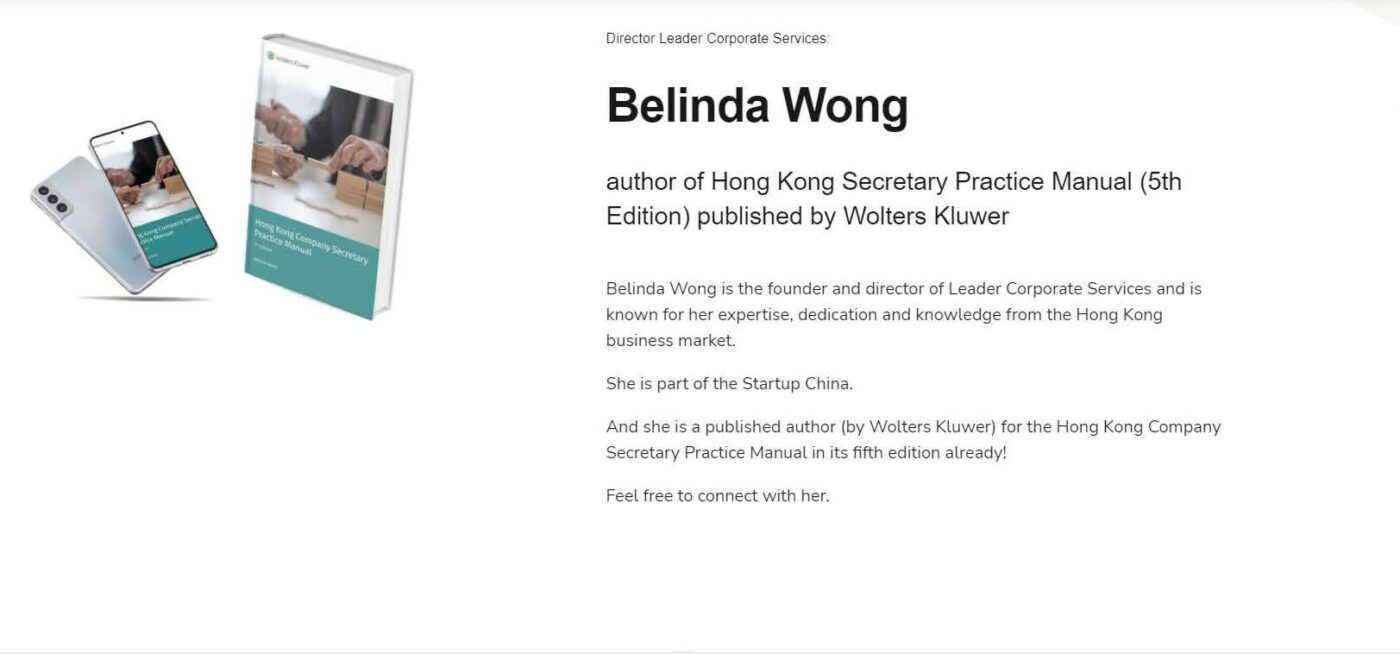
BW Well, the practice manual aims or targets, professionals like lawyers, accountants, company secretaries. It provides all the procedures on how to handle specific matter, like increase of share capital, change of the classification of particular shares and also some companies on Hong Kong company ordinance. So, it is a comprehensive book for those professionals working in the company Secretary field.
JE I know a lot of regulatory books I’ve looked at Income Tax Act and other things. They tend to be very thick, how many pages is the manual?
BW 800.
JE Okay, okay? Yeah. Okay. And is this something that a person can buy in a bookstore like a student can buy to think about preparing for this industry? Or is it something that is just sent to people in the industry? How, how is it distributed? And who buys it?
BW Well, Wolters Kluwer handle the distribution, it is not free. I think this time the price of 1300 Hong Kong dollars a copy. So, it’s not cheap by any standard people. Only a professional will buy it.
About the Industry
JE Okay. Okay. Like company secretaries in each company to have this as sort of a reference manual to refer to when something new comes up. Okay. Very interesting. So, let’s turn to the third section, about the Hong Kong company registration and secretarial industry. I mean, firstly, is that how you define the industry? Or do you define your industry more broadly, as business service providers, you refer to accountants, lawyers, and stuff like that? What industry do you put yourself in?
BW My industry, companies’ secretaries industries. In March, big team, the company’s registry has set up a trust and company service for wider service industries. So, anybody, anybody who would like to set up companies to clients, provide registered office address, handle companies secretarial work and also name company secretaries, will have to be registered with the trust and company service provider. At that time, we have to submit forms to the registry and then depending on the choice of the officers, some officer may come to interview us at our office, and then some may have to go to the police headquarters to have their fingerprints taken. So that to make sure that there’s no criminal involved in his industry. The reasons for the setup of the trust and companies service providers are for anti-money laundering purpose, because Hong Kong is an international financial hub, we have to join force with the international anti money laundering organizations, to fight against AML. So, if we take in any client, and suspects that they are involved in illegal practice, then we’ll have to report it to the relevant agency without alerting the clients. And then once we got the license, the license is valid for only three years, and then we’ll have to renew it every few years. And on top of this, we must attend trainings on anti-money laundering. So, we are regulated since 2018.
JE Okay, so you define the industry as company registration and Secretary that’s a specific industry into itself. So, what about the service providers, your competition? Are they all specialist firms like yours? Or do the big accounting and law firms, in house in their organization, have this sort of service that you’re competing against as well?
BW Well, there are more than 7000 trusts and companies service providers registered with the registry. So, they can be considered as my competitor. But I’m the only persons who writes the Hong Kong companies practice manual. So, you can consider my position is very unique. And as far as I understand, scarcely any company secretary will conduct the CPD seminars for professional bodies, on companies’ secretarial matters, and also comment on the Hong Kong company ordinance. So, to your question is there’s quite a number of competitors, but my position is quite unique.
JE Now, I’m going to add a point here that I didn’t put in the talking points. But we’ve talked about this manual a lot and I think this is very interesting because it’s, it’s a key differentiating factor for yourself. How did it come to be that you wrote this manual? How did you become the author of this manual in the beginning?
BW Well, because when I set up my company in 2010. The most important thing is to grow up my own brand name. And at that time, my friend told me that he said to me, now, under the brand of Walters Kluwer, he was looking for someone to writing the practice manual. So, I approached the publisher got the contract on then wrote the book. The first edition was, was considered successful so I got the right to write the second edition continue on, so on. So, six books to my name.
JE Before you wrote your first edition, was there any manual in the industry written or provided by anyone else?
BW There was a handbook written by a higher institution, but the handbook aimed to students rather than professionals.
JE Okay, so yours was really building up that unique resource, which must have been a lot of work. I’ve written books before and doing an updated edition can sometimes be a lot of work, but writing one for the first time, particularly one 800 pages, can be an incredible amount of work. So that’s, that’s a keyway to differentiate yourself from the competition and, and, and, and show some specialization and competence that sets you apart. So that’s really to be commended. So, let’s talk about the third point. I mean, are you as a service provider, I know there’s the trust entity that you talked about, are you subject to regulation and review? Is there a lot of regulation of your company as opposed to your clients?
BW I must say the regulation of the company’s service provider is not very stringent. We just have to follow the law on and then file all the necessary returns at the registry, and that’s it. The most important thing is to attend seminars on anti-money laundering. So of course, we shouldn’t infringe any rules, because the registries, if there’s any complaints on the service providers then they will investigate into it.
JE Okay, so my last point about the industry, I just want to touch upon this Greater Bay Area that has been created with Guangzhou, Shenzhen and Hong Kong, to make it some sort of uniform regulatory environment in certain ways and I don’t know the details. I have a couple of healthcare clients in Hong Kong that are trying to follow this very closely. What is your view about the GBA? Are we going to are you going to see some big changes in the Hong Kong regulatory environment? Will that have to converge with the mainland? How would you see this affecting company Secretary regulation in Hong Kong?
BW Well, Hong Kong legal regime is different from Mainland China regime. We follow the common law system. Our Hong Kong companies’ ordinance is very different from the company law of China. So, in the long run, I don’t think there will be any change in the Hong Kong. This is also true for Macau. Macau is also a special administrative region. Its law originates from the Portuguese law. So very different from the Hong Kong law and also the Chinese law. Our legal system will be maintained because we serve different functions. Hong Kong is an international financial hub. Our position will be maintained. But going forward, I will see lots of cooperation among the nine cities and two special administrative region, Hong Kong and Macau. Once there is more cooperation, we can attract more foreign investors into our different cities and our administrative regions. And this is also one of the reasons why I agreed to set up the Startup China club in Hong Kong because that would connect China, Hong Kong, the rest of the world
JE In the China club that you’ve set up, is going to really be focused on the Greater Bay Area, or are you looking at all of China in that club?
BW Well, all of China because Hong Kong has been a major springboard for foreign investment into China. Greater Bay Area, one of the big areas, the Belt and Road, and also the western part of China also aim to have more economic development and also want to attract more foreign investments. So South China Club is for all of China.
Case Study
JE Okay, okay. So that’s very interesting discussion about the about the industry and there’s a lot changing in China, Hong Kong and all of Asia right now. But let’s, let’s turn to the final section, the fourth about a case study. Sort of walk us through an example, don’t have to mention the company name, if it’s not appropriate, that you helped at the setup in Hong Kong, and describe the services in the setup process, the order, how long it took, and things like that, just to give someone who’s thinking of perhaps opening up in Hong Kong, what they might have to go through.
BW There are different types of companies in Hong Kong. The majority are the private company, limited with share capital, they are used for trading purpose, they may require a different license. Hong Kong is a financial hub. So, there are many companies which also needs to apply for different licenses from the Securities and Futures Commission. The next type is the company limited by guarantee. Most of them are used for charity purpose and this type of companies needs to apply for charity license from the Inland Revenue department. At the moment I am setting up a charity. So, the first step is to register the company limited by guarantee with the startup share capital for a charity there must be objects, i.e., business scope unless the company is for charity purpose or Hong Kong company do not require objects. That is, they do not have to specify the business scope, in their articles of associations. So, what I do is to understand what are the purpose of the founders of this company, what they want to do, how they want to help. So, the object is to promote art culture in Hong Kong, and also educate the overseas students of the Chinese arts. So, okay, yeah, that three founders, three directors. So, the company’s now already set up and to what is as a charity, we need to write to the Inland Revenue department to advise them, what are the proposed activities of the company in the coming 12 months. And we also need to attach the articles of associations, and also details of the founding members and directors, and then wait for the Inland Revenue department to come back with comments on the articles and also the activities. Normally may take 18 to 24 months to have to be a charity license granted. But in the meantime, that company can undertake all the activities and if charity status is granted, anyone who donates $100 or more to the company can get a donation receipt from the company. And this receipt is tax deductible. And if the company operates all the objects as stated in the Articles of Association, they may not have to pay the profit tax or any other tax.
JE Now, that’s interesting, I want to ask a question, because I let let’s take the other company, the company is limited by shares a trading company and let’s say it’s not a financial institution, so there’s not a lot of other licenses to apply for. So, you said the charity could be 18 to 24 months. For a simple trading company. Without having specialized licenses, how long does it take to set up in Hong Kong,
BW Four to 10 days, depending on the situation of the pandemic? Well, actually, we can hand in paper documents to the companies’ registry and on the other hand, there is an electronic incorporation, anyone who has fitted those facility can just incorporate the company online, you will just pick a few hours. The days no need to stay the business scope. So, any company limited with share capital, can just do anything legal.
JE Okay, so a huge difference in time with the simple trading company to the charity. Now my understanding from charity, I take from Europe and North America, I know lots of charities: UNICEF, Save the Children. I mean, is that what we’re talking about with a company by guarantee a charity in China, a charity in another part of the world, looking to start charitable organizations in Hong Kong. It’s not something that a trading company can apply as a charity and get some preferential treatment or anything.
BW A trading company cannot apply for the charity license. There are only four areas which can be eligible for the license. One is religion, education, community service, and relief of poverty . Except for community service which must be performed in Hong Kong but for all the other three can be worldwide. So, there are quite a number of charities which focus on education and relief for poverty is their main activities in overseas. So, you can call Hong Kong city of generosity of generosity because you’re in Hong Kong, in Hong Kong, these charities get donations and these donations are used overseas
JE That’s, that’s interesting. Now, a follow up question from me on the education, which is an area I’ve been involved with. So, to get this charitable status do you have to be globally, a not for profit, educational? So, the Hong Kong government would make sure you’re not benefiting from this charitable status, but making profits in your overseas operations?
BW Well, in the Articles of Association, you must state that members are not entitled to any dividends or distributions of assets in the event off the liquidations of charities. So, no one can make profit from these charities. And then for education purposes, education, of course, the company can get tuition fees from the students. All revenue must be spent on education purposes, no one can benefit. So, this is the main purpose and also directors of charities should not receive salary from the company.
JE Okay. Okay. But they can pay employees to do the teaching and things like that?
BW Of course. Okay. Charity, in cooperation with the Hong Kong, they may engage professionals to work as chief executive, and also the staff to carry out all these programs.
JE Very interesting. I, I’ve been involved with education for a long time in Hong Kong. But I didn’t know about that. I’ve I seem to have missed something very important. Well, that was very interesting. And just to summarize, something I said at the beginning, you know, I work with a lot of startups, and they’re typically founders in the hard sciences, healthcare, technology, or things. But what I try to do when I when I give courses to them is say, you know, every company has sort of two pieces to it. It has sort of your core technology or product. But every company needs to be well run, needs to have administrative functions, it needs to be profitable, there needs to be a business administration side to that. And that’s what you’re delivering to companies. And I think a lot of startup companies, that the founders come from the technology side, so they need, they need a lot of assistance on the administrative side. So, this is this is something that I hope will be very interesting for companies in the startup as opposed to the SMEs, which have probably learned this by now. So, thank you very much for your time, that was really informative. Be interesting when the border and trade start to restart between China and other parts of the world and the way that GBA goes, but this, this will be very, very interesting. And I’m sure Hong Kong will be a very important hub for a long time to come. So, thank you very much for your time, Belinda. It was very interesting.
BW Thank you. Thank you for the interview.
End.

Benny曾在中国金融市场工作,聚焦于固定收益、货币和资产负债管理。 他目前是宁波一家中型私募基金管理公司量利资本的副总裁。 公司的策略包括各种类型的固定收益投资组合管理和可转换债券投资组合管理。 此外,Benny 还为证券公司母基金、企业投资者和高净值个人等专业投资者提供金融投资服务。
Benny 还一直活跃在证券业务的商业领域,管理客户业务发展战略、营销计划和路演,并为中小型银行和其他金融机构开发和提供金融市场培训计划。
Benny 精通普通话、英语和日语。

自 2014 年春从法国攻读研究生回到中国以来,Jina一直致力于电商领域及其在金融、娱乐和汽车行业的应用。 她是一位多功能人才,能说流利的普通话、英语和法语。
Jina 是 SEIML 在外国客户和中国行政机构之间的主要关系经理,曾多次负责与在中国运营的国际公司和管理人员打交道。 因此,她负责管理公司与客户的所有业务流程外包(BPO)活动。
她拥有经济学研究生学位,并完成了特许金融分析师协会(CFA Institute)颁发的投资基础证书,因此具备协助外国公司进行中国市场研究的知识,包括对潜在客户、供应商或其他第三方进行审查。 她在使用中国社交媒体方面也颇有心得。
Jina 精通普通话、英语和法语。

John 职业生涯的前 24 年是在投资银行度过的,先是在多伦多,后来短暂去了纽约和伦敦。 他曾为欧洲、中东和非洲地区的大型基金提供债务资本市场(DCM)、股权资本市场(ECM) 和战略投资咨询。
2004 年,他转入学术界,在英国和中国的大学设计并开设了投资管理硕士课程。 在英国大学就读期间,他还创建并管理着欧洲一家规模较大的金融专业培训机构(该机构是培训公司的合资伙伴)。
2016 年,John 重返行业,与初创企业以及各种平台和生态体系合作,为这些处于早期和中期阶段的公司提供支持。 起初,他在上海地区开展这项业务,但后于 2024 年迁至香港,以便在东南亚地区建立 SEIML 的足迹。 John 还是香港创始人协会(FI)生态体系的董事和 创始人协会东盟金融科技加速器的项目总监。